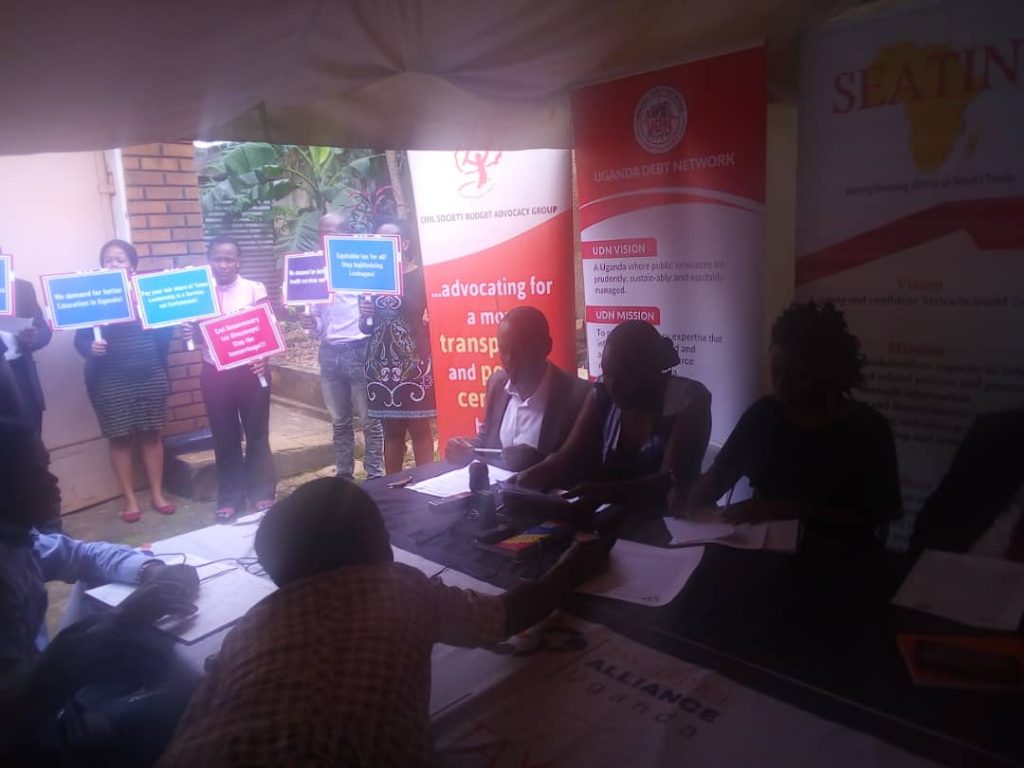CSO’s call for deeper scrutiny into UGX 500bn tax waiver

Civil society organisations have asked the Auditor General to investigate tax exemptions being proposed by the executive, to preclude the possibility that powerful individuals could be using them to siphon public resources.
The CSO’s are also concerned that the waivers are being pushed through in the absence of a well-defined policy framework to guide the process.
Parliament this week passed tax waivers worth UGX 500 billion ($135 million) in favour of companies that have benefitted from similar actions over the past ten years. In a joint address to media this week, the Southern and Eastern Africa Trade Information and Negotiations Institute SEATINI, the Civil Society Budget Advocacy Group CSBAG, the Anti-Corruption Coalition of Uganda ACCU, Action Aid and their Tax Justice Alliance umbrella, also faulted legislators for voting to exempt themselves from the Over the counter tax OTT, despite their hefty pay, while citizens of lesser means are left to shoulder the burden.
The tax waivers were passed as the national teachers union called a nationwide strike over unfulfilled salary enhancement pledges.
Singling out individual beneficiaries, Action Aid’s Fred Kawooya observed that listed drug maker CIPLA-Quality Chemicals was the beneficiary of an UGX 57 billion tax waiver in 2017. The same company has been recommended for another UGX 29 billion tax waiver this year despite posting a profit of UGX 6.7 billion according to the 2018 numbers it released this week.
Another beneficiary, garment maker Nyanza Southern Range who had their UGX 86 billion tax tab picked by the treasury in 2007, is now lined up for another UGX 6 billion waiver.
“We have consistently been paying taxes for some of these companies consistently. That is why the Auditor General needs to look into their affairs because it is difficult to imagine that they have been making losses all this time. We also need to take interest and look into who is behind these companies. Otherwise Ugandans might be duped when there is someone is benefitting from what could be a scheme to siphon money from the tax payer,” Kawooya said.
He also suggested that rather just keep paying these companies taxes, government should either just write the outstanding tax as a bad debt rather that pick hard cash to compensate for their failure. Alternatively, the cash paid on their behalf should be converted into equity so that the public gets some return.
Kawooya’s call was echoed by Ms Cissy Kagaba of Anti-Corruption Coalition-Uganda who said it was necessary to make the ownership of the beneficiary companies’ public I order to bring transparency to the process.
She also finds it contradictory that MP’s who need revenue to fill the gap created by their exemption from OTT, would endorse corporate exemptions that drain the treasury on that scale.
“There is a need for members to restrain their greed because they are becoming a liability to Ugandans, a bottomless pit that cannot be satisfied. This level of self-entitlement is unsustainable” she said.
Uganda Debt Network’s Imelda Namagga says it is strange for MP’s to pass a tax that they see as a burden to themselves, without considering the poor members of society who have to bear the additional burden of footing the MP’s OTT bill.
She also wondered why it was the big profitable corporations benefitting from the waiver while struggling SME’s which make up the bulk of Uganda’s manufacturing sector are never considered for similar rebates.
According to some studies, Uganda has just over 4,725 factories, most of them micro, small and medium enterprises. These account for 80 percent of manufactured output and 90 percent of the private sector.
CS-BAG’s Julius Mukunda asked parliament to reverse the proposal to for the house to meet MP’s OTT bills.
“This is the issue we raised last year because OTT is regressive in nature. If the MP’s cannot pay, who can? All this is happening because we lack an independent remuneration body that should determine the compensation for all public servants including MP’s,” he said.
Pointing to the opportunity cost of allowing the UGX 500 billion waiver, Ms Jane Nalunga the Country Director for SEATINI in Uganda said besides missing revenue targets, that money was enough to pay 69,444 grade three primary school teachers a monthly salary of UGX 600,000 for one year or a salary of UGX 613,158 for a similar period or cover the cost of an optimal blood supply for Uganda fort eight years.
The CSO’s are now demanding that parliament halts the proposal to pass its members OTT obligations to the public; and government to establish a multi-stakeholder monitoring panel to evaluate the relevance of awarded tax incentives, exemptions and holidays.

 African Heads of state head to South Korea next week for Summit talks
African Heads of state head to South Korea next week for Summit talks
 Trading leads as main source of income for Ugandans
Trading leads as main source of income for Ugandans
 New leadership for bankers’ umbrella as total assets top $12 billion
New leadership for bankers’ umbrella as total assets top $12 billion
 Brussels Airlines to announce Nairobi service
Brussels Airlines to announce Nairobi service
 SITA promises enhanced travel experience after Materna acquisition
SITA promises enhanced travel experience after Materna acquisition
 Saudia’s 105 aircraft order stretches A320neo lead over rival Max
Saudia’s 105 aircraft order stretches A320neo lead over rival Max
